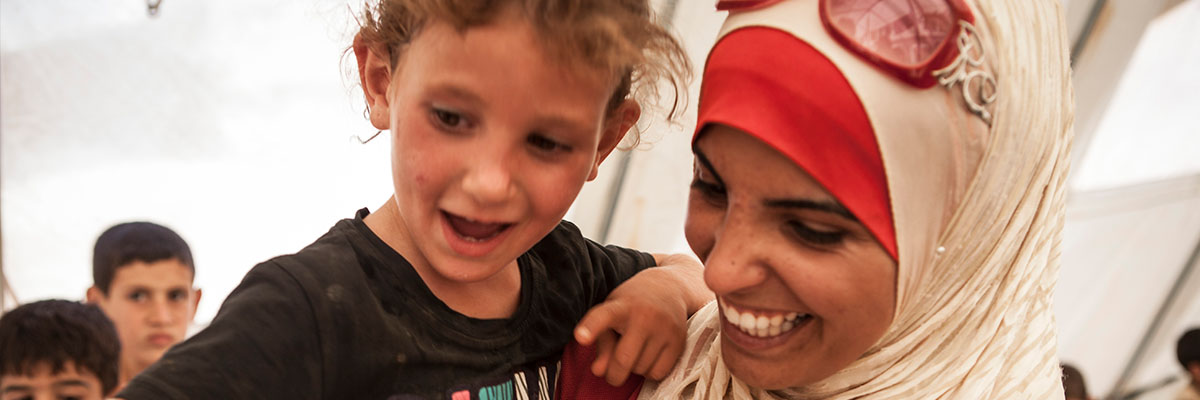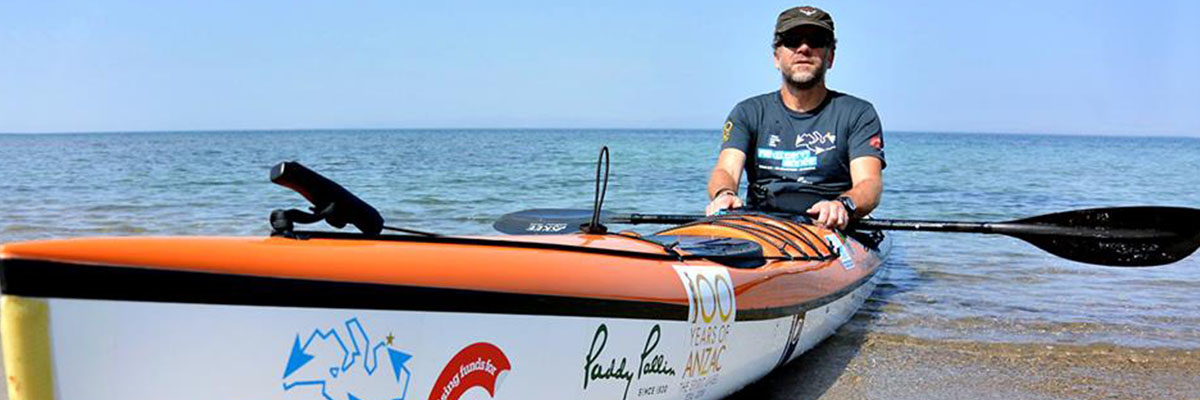A 14,000 kilometre journey through human kindness
The beautiful people I met – adults and children – were so grateful for the welcome they have: the place to stay, the food to eat, for the people that help them. 'It is not right that poor people should impose upon poor people' was a refrain I heard a number of times from the refugees.
Huw Kingston is an adventurer, entrepreneur, cafe owner, event director, environmentalist, cycling advocate, journalist and writer, economist, adventure tour guide and grandfather.
Huw is also a Community Ambassador for Save the Children and our biggest ever individual fundraiser. In mid-2015 Huw returned from his grandest adventure to date, mediterr année, a year long, human-powered circumnavigation of the Mediterranean Sea. Beginning from and returning to Gallipoli, the journey was a commemoration of the Anzac Centenary as Huw sea kayaked, walked, cycled and rowed a boat 14,000 kilometres through 17 countries. At a time of immense and tragic upheaval in the Mediterranean this journey was touched by human kindness throughout.
Aside from the vast personal, logistical and geopolitical challenges this expedition posed, Huw also sought to highlight the heart wrenching plight of the innocent kids caught up in the conflict of warring ‘grown ups’. Mediterranean is his recently released book, that documents this incredible journey. The excerpt below reflects on his encounter with a large cohort of recently displaced Syrians among other groups of refugees in the Greek Islands.
Different Welcomes
A year after my journey was complete, I visited the Greek Island of Lesvos again, I was there with Save the Children to see first-hand the work they were doing.
I spoke often during my Mediterranean journey of the welcome I received everywhere I went and the freedom I had to receive those welcomes when, coming from the sea, I landed on a beach somewhere.
In the two refugee camps on Lesvos on a near 40-degree day, I spent a very informative day with some very special people.

There were two camps on Lesvos; Moria and Kara Tepe, which together house about 3000 people. The word I heard often, from both refugees and workers, was 'stranded'. Up until the end of 2015 people were arriving on boats from Turkey, over a million – Syrians, Afghans, Iraqis, Pakistanis and others – and after being registered they moved on within a day or two. Now with the borders across Europe closed and a deal between the EU and Turkey in place, people arriving in Lesvos stay on Lesvos.
How long for? How long is a piece of string?
Save the Children offer Child Friendly Spaces in the camps. Secure places where children and mothers can go to play, eat, learn, breastfeed or whatever. They are very popular. At Kara Tepe I met a woman, Noor, who had left the north west of Pakistan. Through tears Noor told me that, after a long time of being persecuted, she fled two days after the Taliban beheaded her husband and brother in the local market. This highly educated woman left with her three-year-old daughter and arrived eventually to the coast of Turkey. Then, by night, she paid a smuggler to board an inflatable with 20 others and thus to Lesvos. She was so grateful for the safety and peace she has now. 'If I lose hope I lose everything' she told me. Her daughter asked for her father every night.
I spent nearly two hours with Sera, a Syrian woman and her family of seven girls and one boy (Lucky boy? Unlucky boy?); aged 18 months to 13 years. She and her husband were from a Syrian town close to the border with Turkey. A city that was destroyed by Islamic State. They were Kurds, an ethnic group that has long been persecuted in Syria and elsewhere. After nearly five years of dislocation, moving away from and back to their town but always within Syria, the murder by IS of close relations made them flee. Fleeing with eight children. Imagine. Eight children.

The eight children were all beautiful. Of course children are the world over. Beautiful with their smiles, their impishness and their inquisitiveness. Their innocence. They were there in a refugee camp, living in one small, unbearably hot four metre x three metre hut in a camp where the water was turned off for six hours each day. They are there only because of an accident of birth. My grandchildren are living free in Sydney, Australia, a place that is their home. They are there only because of an accident of birth.
One of Noor's eldest daughters showed me a photograph. The photograph shows her and some of her sisters holding a painting they had done. On it there is a boat full of people surrounded by a sea full of people. On it there are girls in a cell crying for help with a guard outside. In the foreground children are running. Running away.
The kindness and involvement of people was uplifting too. People who months ago probably thought they would never use a skill they had and now do so in the camps. Like Ioanna, the young part Greek, part Egyptian lady who translated Sera's Arabic for me. Or Costas who for 25 years had lived on Lesvos. Lived there since he left Libya and met a Greek girl whom he married. Lives there with a Libyan passport even though he feared ever travelling to Libya again. Now Costas worked to entertain the children, entertaining them in Arabic, a language he thought he'd never use again. His original Libyan name, Adel, means justice in Arabic. Justice indeed.
At the time of my visit there were some 2000 unaccompanied minors in Greece; children under eighteen who left, lost or became separated from their parents.
'Inshallah' – God willing. I am not a believer in any god but I heard many clinging to hope that their God would see them through. This despite the fact you could argue that their religion is bound up in the current madness. I cannot deny that clinging to hope in God may see them through. It may be the only way to retain hope. I don't know; I've never had to cling to a future.
I waited many times on my Mediterranean journey. At one point I waited for two weeks on the Greek Peloponnese to cross to Turkey in a rowing boat. But at any point I could choose to stop my waiting and take another path. The people in Moria and in Kara Tepe cannot choose to stop their waiting.

Part of me felt guilty for the pleasures I had taken from the Mediterranean at a time of such conflict. It is of course a sea given to offering pleasure to millions of people year after year. Most take this pleasure and leave little in return as a gift to their host. Most head home at the end of the party, leaving the Mediterranean to deal with the plastic, the rubbish, the derelict and abandoned developments. I can only hope that more will start to consider the environment of the Mediterranean as something to be cherished and that many more will consider helping those whose lives have been shattered on it or near it. A charmed and troubled sea indeed.
Images: Save the Children